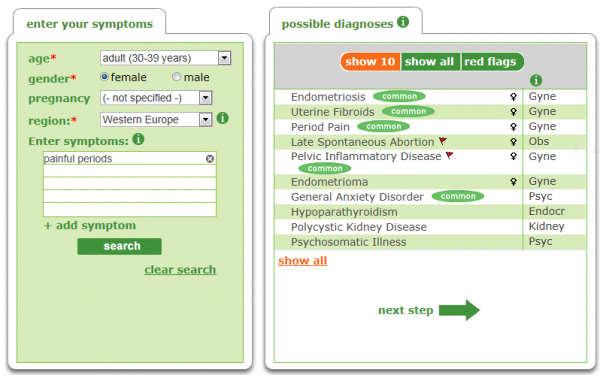- Privacy Policy
- Terms & Conditions
- Contact us
- ©Isabel Healthcare 2025
Symptom Information: Painful Periods / Dysmenorrhea
Symptom:
Painful periods (Other names: dysmenorrhea, dysmenorrhoea)
General Description:
Most women will experience some degree of pain during their regular menstrual periods.This is normal and should be expected. The womb (uterus) is a large muscle and contracts continually but these are mild contractions and not usually felt. Around the time of the period (menstruation) the contractions become stronger as the blood supply is temporarily cut off during the contractions and this is what causes the pain. The purpose of the contractions is to enable the womb to shed its lining each month and this is lost as a bleed (menstrual period). This is an essential part of female fertility and the period pain caused by it is a side effect. Occasionally, in some women, the period pain can be extremely intense and the cause should investigated so that treatment can be determined or self-help mechanisms put in place.
Causes:
If you have experienced severe painful periods (dysmenorrhea) since you began menstruating, then it is unlikely that a cause will be found and it may be just a part of your normal fertility cycle. There are certain things, like stress, which can aggravate the condition. You should speak with your doctor as this could be primary dysmenorrhea and they will be able to recommend lifestyle changes such as swimming or gentle exercise, using medication if necessary, or a trial of a TENS (transcutaneous electronic nerve stimulation) machine to ease the pain.
More serious causes of painful periods (also termed secondary dysmenorrhea) include:
- Endometriosis – this is caused by the cells lining the womb growing in the fallopian tubes or ovaries. When these cells shed and fall away they cause intense pain.
- Uterine fibroids – non-cancerous tumors grow in the womb and can cause heavy and painful periods.
- Pelvic inflammatory disease – the womb, fallopian tubes and ovaries become infected with a bacteria which leads to inflammation. Other symptoms include fever and vaginal discharge.
- Adenomyosis – tissue lining the womb starts to grow within the muscular wall of the womb. This extra tissue causes painful periods.
- Intrauterine device (IUD) – An IUD is a form of contraception, if you have had an IUD recently fitted then this can cause some pain in the first three months.
Period pain is rarely a sign of disease but, as a general rule, you should consult with your doctor if the pain interferes with your life and prevents you from working, or carrying out your normal daily tasks. Also, if you experience any unusual vaginal discharge or pain as a result of sexual intercourse.

Isabel symptom checker showing possible causes of the symptom painful periods
How you can help your doctor:
Before your consultation with you doctor, think about the following questions they may ask you.
- Describe your period pain.
- Do you get pain only around the time of your monthly period or does the pain occur at other times. If so, how frequently?
- Does anything relieve the pain you experience?
- Do you have any other symptoms like fever, vaginal discharge or pain after sexual intercourse?
- Have you recently had an intrauterine device fitted?
You should call you doctor right away if you experience any of the following symptoms:
- Increased or foul-smelling vaginal discharge
- Fever and pelvic pain
- Sudden severe pain especially if your period is more than a week late and you have been sexually active since your last period.
- You pass blood clots or have other symptoms in addition to the pain
You should also make contact with you doctor if you have any of these longer term problems:
- You have experienced pain with your period for three monthly cycles and the treatments do not control the pain.
- You have pain and had an IUD fitted longer than three months ago.
- Your pain occurs at other times besides during your monthly menstrual period.


Mandy Tomlinson
Mandy has worked for Isabel Healthcare since 2000. Prior to this, she was a Senior Staff Nurse on the Pediatric Infectious disease ward and high dependency unit at one of London's top hospitals, St Mary’s in Paddington which is part of Imperial College Healthcare NHS Trust. Her experience in the healthcare industry for the past 33 years in both the UK and USA means she's a vital resource for our organization. Mandy currently lives and works in Scottsdale, Arizona.
Subscribe Here!
Recent Posts
Isabel DDx Companion with ChatGPT Integration - to help you diagnose even faster
At Isabel Healthcare, we’ve always been driven by one goal: to make clinical reasoning faster,..Virtual Triage: Do more questions lead to better patient outcomes?
One of the common misconceptions related to virtual triage / symptom checker tools is that the more..List Of Categories
- Differential Diagnosis Decision Support
- Differential diagnosis
- Symptom Checker
- Symptoms
- Medical Error
- Patient Disease Information
- Disease
- Clinical Decision Support
- Diagnostic Decision Support
- Isabel 1 Minute Read
- Diagnosis Error
- Diagnosis Skills Cases
- Healthcare Informatics
- Clinical Reasoning
- Evidence-based Medicine
- Medical Education
- Patient Engagement
- Symptom Triage
- Nurse Practitioner Education
- Nursing Decision Support
- Partnership
- Public Health
- COVID-19
- EHR
- Patient Empowerment
- Patient Safety
- rare disease

Start your FREE Trial today
Try the Isabel Pro DDx generator for 30-days - no payment card details required.



